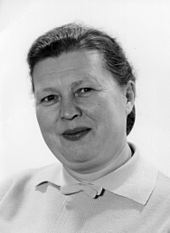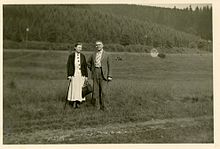Else Drenseck
Else Drenseck (* December 24, 1911 in Herne ; † December 13, 1997 there ; born as Else Emmerich ) was a German politician ( SPD ) and manager of the Herne district association of workers' welfare .
Life
Else Emmerich was the daughter of the miner Johann Peter Emmerich and his wife Pauline Emmerich geb. Thiele. Grandparents were the miner Peter Emmerich and Elisabeth Emmerich geb. Richter, as well as Hubert Thiele and Sophie Thiele born. Pricing Grandfather Peter had immigrated from Friedberg (Hesse) to Hofstede (now part of Bochum) and as the “red Emmerich” was already a social democrat under the Socialist Act . The Thieles were Catholic, the Emmerichs Protestant, the daughter was not baptized. Her father was a member of the SPD and the miners' union as well as the workers' and soldiers' council, her mother was a member of the Free Welfare Association (later Arbeiterwohlfahrt - AWO), took part in training courses and organized children's camps. Grandmother Sophie took Else Emmerich to the Catholic Church, father Peter to the SPD assembly.
Else Emmerich attended the Evangelical School until the secular school was founded . The family's economic circumstances did not allow attending the AWO welfare school, so from 1926 she completed an apprenticeship at the consumer association "Wohlfahrt" eGmbH in Bochum and then worked as a saleswoman and manager in several of the consumer association's shops in Herne. It had been unionized in the Central Association of Employees since 1926 .
Since April 1926 she was a member of the Socialist Workers' Youth and, together with her future husband Heinrich Drenseck, co-founder of the SAJ group Herne-Constantin. Until 1933 she was the second chairwoman there. In January 1928 she joined the SPD. During this time there were acquaintances and friendships with leading social democrats in Herne, for example Karl Hölkeskamp, Auguste Sindermann, Berta Schulz (Member of the Bundestag), Julius Benz, Heinrich Crämer, Jakob Hilge and for them impressive encounters at SPD events and youth days of the SAJ (e.g. B. with Janette Wolf, Anna Siemsen).
Nazi and wartime
With the " seizure of power " by the National Socialists in 1933, the social and social democratic network broke. The SPD was banned with its youth organization and its press. The main committee of the Arbeiterwohlfahrt was taken over as a "useful link" in the National Socialist German Labor Front . The social democratic board of directors of the consumer association “Wohlfahrt” was dismissed, the distribution network was reduced, social democratic warehouse keepers, distribution point managers and saleswomen were dismissed; Else Drenseck also lost her job.
Like many others, Else and Heinrich Drenseck withdrew into a private environment, they married on October 3, 1933 and found an apartment in Herne-Sodingen on Max-Wiethoff-Straße. The son Heinrich Peter (Heinz) Drenseck was born on May 21, 1939 in the Bochum State Women's Clinic. In mid-1943 Else Drenseck and son Heinz moved to Papenhausen (today in Bad Salzuflen , Lippe district) in two rooms on a farm because of the increasing bombing . At times they took in the wife and a son of their brother Hubert Emmerich. Since mid-1944 she has been urging her parents-in-law to come to Lippe from East Prussia. The husband was taken prisoner by the Soviets on the way from the Beskids to Slovakia and died there on April 14, 1947.
Else Drenseck thought the news of his death was uncertain and did not have it certified until August 25, 1958. After the end of the war she went back to Herne. She was given two rooms in the apartment of the family of her former SAJ comrade Karl Schwertfeger (Herne, Wiescherstraße 139).
Workers welfare
Else Drenseck was able to get involved as a social worker , social politician and organizer in line with her previous career aspirations . In July 1945 she founded the Herne local committee of the workers' welfare together with Karl Hölkeskamp and Auguste Sindermann. Else Drenseck built the first two children's recreation homes in the AWO district of Western Westphalia in 1945/1946 and ran them on a voluntary basis. It was the Königstein children's home in a restaurant in Hattingen and the children's home on Hedtberg in Dahlhausen , a leisure home that was built by the “freely organized workers” (SPD, AWO, SAJ, etc.) in 1925–1929.
One focus of the work was the distribution of food aid and donations from Swiss Aid, the British Red Cross and the CARE organization to people in need, especially those with TB . In the sewing rooms, pieces of clothing, but also dolls and other toys, were made from scraps of fabric and textile donations.
Else Drenseck's job was to get food for the food stamps that the needy people could give away.
In 1947 Else Drenseck was elected to the board of directors of the Bochum sub-district (consisting of the cities of Bochum, Herne, Wanne-Eickel, Wattenscheid and Witten), to which she belonged until it was dissolved. In 1950 she was chosen by the Herne district association as the successor to Auguste Sindermann as honorary managing director, and she held this position until the full-time managing director Fritz Benthaus was elected.
On the initiative of Else Drenseck, the district association of Herne set up its first old people's meeting place in 1951, which, like all later meeting places, was looked after on a voluntary basis.
From 1964 to 1982 Else Drenseck was a member of the AWO district board for Western Westphalia (since 1973 deputy chairwoman), she was a member of the AWO federal board from 1965 to 1974, then from 1974 to 1978 she was a member of the AWO federal committee. She ran the construction of an old people's home in Herne- Börnig (today "Else-Drenseck-Seniorenzentrum"). It set the claim to build a model facility for the time with 38 apartments for the elderly, 110 single apartments in the old people's home and 45 rooms in the care wing. Solidarity, compassion, political vigilance, tireless helpfulness, motherliness, open-mindedness and courage describe your personality in narrated episodes and anecdotes as well as in published appreciations, e.g. B. for 60th and 80th birthday.
Local politics
For Else Drenseck, social democracy and workers' welfare formed a complementary unit. It was only logical for them to feel committed to the citizens of their city and to local politics. She was a member of the first democratically elected council of the city of Herne as early as 1946, and remained so until the laws on local reorganization came into force on January 1, 1975. Else Drenseck (mayor since 1964) and other local politicians made room for new members in the new council of the city of Herne.
Else Drenseck found her duties first and foremost in the social committee (previously welfare committee) and in the youth committee. She tried to help refugees and displaced persons (1947: 6,751 people, 1950: 11,949 people) and to dismantle mass quarters in schools and restaurants.
A big event for her was her participation in the 1st City Congress, the founding congress of the German Association of Cities on May 20, 1948 in the Paulskirche in Frankfurt . She was very impressed by an intensive encounter with Louise Schroeder (Mayor of Berlin), whose drive and courage she admired.
Over the years, she took on additional offices and responsibility in the SPD district executive, on the executive board of the SPD council faction and in council committees (including the main and finance committee) in committees of the Sparkasse and municipal companies. Else Drenseck was one of the pillars of the overall municipal policy concept, but continued to be the social politician of the SPD parliamentary group, even after she left the council, she was a citizen's representative in the social and health committee from 1979 to 1984. It was a good thing for her that Edwin Ostendorf saw his main areas of interest in the areas of social and youth welfare as well as school policy in the committees of the German Association of Cities and the German Association for Public and Private Welfare. Else Drenseck was always convinced that local politics is not “small local politics”, but that it is decisive for the concrete quality of life of the people, that it meets the needs of the citizens precisely, that democratic awareness, civic co-responsibility and justice are realized here.
The city council of Herne elected Else Drenseck as mayor on October 12, 1964. She was the first woman in the history of the city to be given this office; it held it until the municipal reorganization in 1974.
Her estate contains numerous handwritten concepts for speeches at party congresses, in local associations and in front of the city council; later she addressed speeches and greetings to guests of the city, especially to schoolchildren and young people from Herne's partner cities, to clubs, companies, home meetings, and exhibition openings. At every opportunity she brought her basic values: peace, solidarity, tolerance, justice, humanity. In her speeches and reports , she is proud of what she has achieved, based her values on the need for further projects and shows the political resistance.
In 1958 Else Drenseck took over the justification for a resolution of the council against the decision of the majority of the Bundestag to equip the Bundeswehr with nuclear weapons. The risk of nuclear war increases with the spread of weapons, and the “ balance of terror ” and the chance of disarmament can only be maintained if the equilibrium between the giants USA and the Soviet Union is not disturbed. She appeared particularly committed on the occasion of a visit by Erhard Eppler to the opening of a development aid exhibition on August 30, 1969. Many of the principles outlined today by NGOs and one world politicians have been addressed. For her services to the city of Herne, she was awarded the city's ring of honor in 1960.
Else Drenseck lived with her son Heinz's family in Herne. When family care was no longer possible, she moved to the AWO's Willi Pohlmann senior center. After an accident from which she could no longer properly recover, she died accompanied by family and friends on December 13, 1997.
Memberships
- 1930–1986: member of the SPD
- 1946–1974: Member of the City Council of Herne
Honorary positions and honors
- 1964–1974: Mayor of the city of Herne
- October 27, 1966 to November 1, 1969: Advisory Board on the Federal Executive Board of AWO Germany
- November 1, 1969 to October 3, 1974: Assessor on the Federal Board of AWO Germany
- In recognition of her services to workers' welfare, she was awarded the Marie Juchacz plaque , the AWO's highest award, on October 30, 1979 .
- posthumously : Renaming of the senior citizens' home "Am Katzenbuckel" in Herne-Börnig to Else-Drenseck senior center
literature
- Cornelia Objartel-Balliet: “Send them for consumption”. Memories of Else Drenseck. In: Frank Braßel (Ed.): "Nothing is as beautiful as ..." History and stories from Herne and Wanne-Eickel. Klartext, Essen 1991, ISBN 3-88474-365-1 .
Web links
Individual evidence
-
↑ Your memories from this time can be found in
Jutta de Jong: Konsumverein Wohlfahrt. Bochum 1985.
and
Cornelia Objartel-Balliet: “Send them for consumption”. Memories from Else Drenseck. (see literature ) - ↑ Westdeutsche Allgemeine Zeitung of June 3, 1971
- ↑ Westfälische Rundschau from 24./26. December 1971; Westdeutsche Allgemeine Zeitung of December 27, 1991
- ↑ Karin Sandmeier, Gabriele Wand-Seyer: In the shadow of history. Women's life in Herne from the Middle Ages to the present. (Published by the Equal Opportunities Office of the City of Herne) Herne 1997, p. 83 ff.
| personal data | |
|---|---|
| SURNAME | Drenseck, Else |
| ALTERNATIVE NAMES | Emmerich, Else (maiden name) |
| BRIEF DESCRIPTION | German politician (SPD) |
| DATE OF BIRTH | December 24, 1911 |
| PLACE OF BIRTH | Herne |
| DATE OF DEATH | December 13, 1997 |
| Place of death | Herne |










